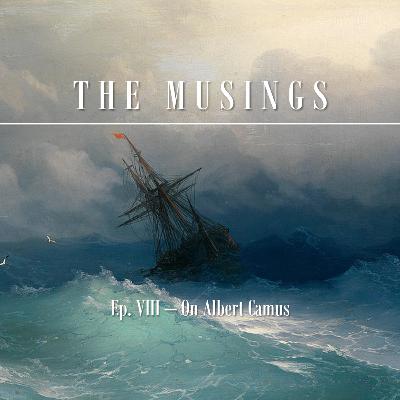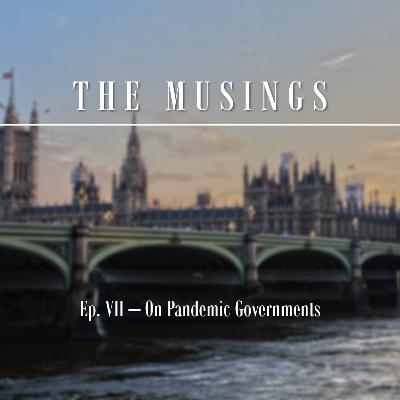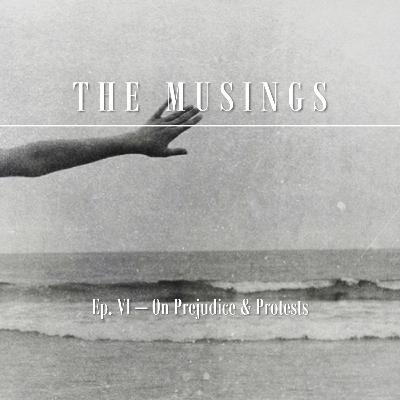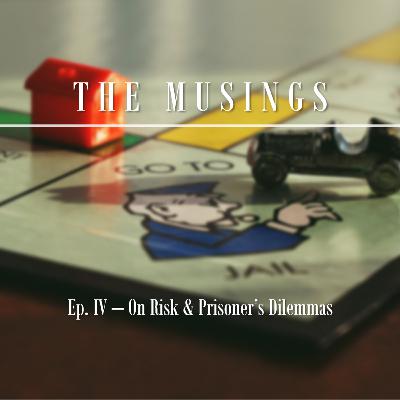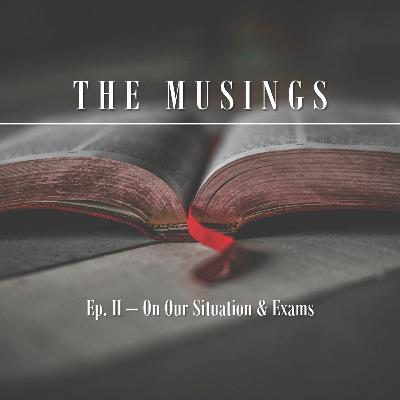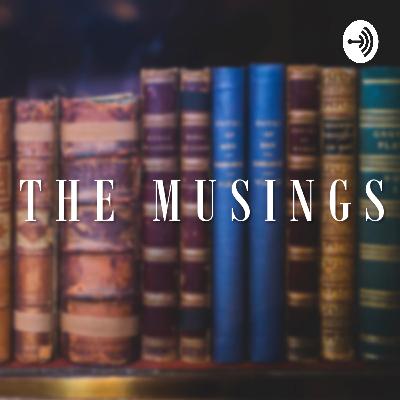Discover The Musings
The Musings

The Musings
Author: The Musings
Subscribed: 1Played: 1Subscribe
Share
© The Musings
Description
In this podcast, we attempt to respond to events happening around us by asking ourselves: what is the Philosophy, the Psychology, the Science, the History or the Maths at play here. We hope our discussions sparks your interest in such a subject, and that you may continue our findings.
11 Episodes
Reverse
Welcome back to The Musings Podcast for season 2! In this episode we discuss the complex topic of Repatriation of museum artifacts, the meanings of culture, heritage, cultural heritage, cultural continuity, nations, repatriation, ownership and stewardship . This has been an incredibly rewarding topic to research and learn about, and much of what we learned could not feature in the episode, however all links are featured down below and we highly recommend reading them! Thank you for listening last season and we hope you enjoy!
Sources:
Vox: The British Museum is full of stolen artifacts: https://www.youtube.com/watch?v=hoTxiRWrvp8
The Verge: Ill-gotten gains: https://www.theverge.com/2013/5/13/4326306/museum-artifacts-looted-repatriation
Wiki British Museum controversies: https://en.wikipedia.org/wiki/British_Museum#Controversies
The Guardian: BM is world's largest receiver of stolen goods, says QC: https://www.theguardian.com/world/2019/nov/04/british-museum-is-worlds-largest-receiver-of-stolen-goods-says-qc
The Guardian: Why western museums should keep their treasures: https://www.theguardian.com/culture/2018/nov/25/benin-bronzes-why-western-museums-should-keep-treasures
Standford Phil: Cultural Heritage: https://nam02.safelinks.protection.outlook.com/?url=https%3A%2F%2Fplato.stanford.edu%2Fentries%2Fethics-cultural-heritage%2F&data=02%7C01%7C%7Cdf47f884da6e40a1de9508d84034f436%7C84df9e7fe9f640afb435aaaaaaaaaaaa%7C1%7C0%7C637329943468290767&sdata=4PA%2BwJBpwjuIexR16GOv47hAZFM6rZ2wdDy7sXtoDss%3D&reserved=0
The Conversation: why Western museums should return African artifacts: https://nam02.safelinks.protection.outlook.com/?url=https%3A%2F%2Ftheconversation.com%2Frepatriation-why-western-museums-should-return-african-artefacts-117061&data=02%7C01%7C%7Cdf47f884da6e40a1de9508d84034f436%7C84df9e7fe9f640afb435aaaaaaaaaaaa%7C1%7C0%7C637329943468310769&sdata=aaRMsEyUwFxOiIZZWcKuMzcpn%2BrQblqHZB02Ox39SBA%3D&reserved=0
Jenkins 2018: https://www.jstor.org/stable/j.ctv512v68.13?seq=11#metadata_info_tab_contents
The Guardian: Should museums return their colonial artefacts: https://www.theguardian.com/culture/2019/jun/29/should-museums-return-their-colonial-artefacts
History Today: Do historical objects belong in their country of origin: https://nam02.safelinks.protection.outlook.com/?url=https%3A%2F%2Fwww.historytoday.com%2Farchive%2Fhead-head%2Fdo-historical-objects-belong-their-country-origin&data=02%7C01%7C%7Cdf47f884da6e40a1de9508d84034f436%7C84df9e7fe9f640afb435aaaaaaaaaaaa%7C1%7C0%7C637329943468340727&sdata=0SlX2yHRvQEwuCC2gQ9ZnHy8ctoydJuxpcv1A2NfplU%3D&reserved=0
Wiki British Museum Act 1963: https://en.wikipedia.org/wiki/British_Museum_Act_1963
Music:
Nocturne in B Flat Minor, Op. 9 No. 1: "A Madame Camille Pleyel" · François Chaplin Chopin: Nocturnes ℗ 2013 Zig-Zag Territoires ℗ Anima Eterna Released on: 2010-03-01 Composer: Frédéric Chopin
In this episode, we discuss the meaning and origins of nationalism and patriotism, we argue whether nationalism can be a force for good as discussed in the IntelligenceSquared debate. We also talk about the nature of closed borders currently, as well as the implications and benefits of open borders for culture and labour.
Please comment any questions you have in the youtube comments or dm us on instagram: @themusingspodcast
Sources:
Intelligence Squared - Nationalism is a Force for Good: https://www.youtube.com/watch?v=LYra0iKYTtg&list=WL&index=2&t=0s
F. Fernandez Armesto: Out of Our Minds: https://www.amazon.co.uk/Out-Our-Minds-What-Think/dp/B07V58MZRQ/ref=sr_1_2?dchild=1&keywords=out+of+our+minds&qid=1594315243&sr=8-2
Yuval Noah Harari: the world after coronavirus FT: https://www.ft.com/content/19d90308-6858-11ea-a3c9-1fe6fedcca75
Rutger Bregman: Utopia for Realists: https://www.amazon.co.uk/Utopia-for-Realists/dp/B01MRBZ70S/ref=sr_1_1?crid=3UMC0ZNTAA4W&dchild=1&keywords=utopia+for+realists&qid=1594315332&s=audible&sprefix=utopia+%2Caudible%2C153&sr=1-1
Goodbye Globalisation’ (16.05.20) The Economist
Vexillology: https://en.wikipedia.org/wiki/Vexillology
Heraldry: https://en.wikipedia.org/wiki/Heraldry
Stanford Encyclopedia of Philosophy: Nationalism: https://plato.stanford.edu/entries/nationalism/
Kants Cosmopolitan Law: https://pdfs.semanticscholar.org/ef72/d6803a6f94d2a68ac668ffc89bc9f72b3246.pdf
Music: Nocturne in B Flat Minor, Op. 9 No. 1: "A Madame Camille Pleyel" · François Chaplin Chopin: Nocturnes ℗ 2013 Zig-Zag Territoires ℗ Anima Eterna Released on: 2010-03-01 Composer: Frédéric Chopin
In this episode, we discuss the French author and Nobel Prize winner Albert Camus; his life and works as well as his philosophy present in both. We focus on his novel 'The Plague,' about the people in a town that must lockdown after the plague returns, and the overlaps in events and emotions we experience today regarding the coronavirus pandemic. We also discuss his essay 'The Myth of Sisyphus,' and the novels 'The Stranger' and 'The Fall.'
Many thanks to Inès for joining us this episode and providing insight into Camus' works and his life. Please visit her website Piece of Mind to read some fantastic articles on arts and culture: https://www.ourpieceofmind.com/
Sources:
The Plague: https://www.amazon.co.uk/Plague-Penguin-Modern-Classics/dp/0141185139/ref=pd_bxgy_img_2/261-2588424-5006005?_encoding=UTF8&pd_rd_i=0141185139&pd_rd_r=416de315-14f1-4dff-ae2d-2fce7e9c2fec&pd_rd_w=twzym&pd_rd_wg=4XICu&pf_rd_p=4795fa9c-dbc3-4c88-a594-faab30ac5059&pf_rd_r=SPF3BDC66EY7MT0HNQNH&psc=1&refRID=SPF3BDC66EY7MT0HNQNH
The Fall: https://www.amazon.co.uk/Fall-Penguin-Modern-Classics/dp/0141187948/ref=pd_bxgy_img_3/261-2588424-5006005?_encoding=UTF8&pd_rd_i=0141187948&pd_rd_r=c7b24e9d-cd9e-4e8c-aedf-96548ca0ec58&pd_rd_w=h5qu3&pd_rd_wg=leEWb&pf_rd_p=4795fa9c-dbc3-4c88-a594-faab30ac5059&pf_rd_r=FTR1AVE5GTGK9E286S2K&psc=1&refRID=FTR1AVE5GTGK9E286S2K
The Stranger: https://www.amazon.co.uk/Outsider-Penguin-Modern-Classics/dp/0141198060/ref=tmm_pap_swatch_0?_encoding=UTF8&qid=1593466653&sr=8-6
The Myth of Sisyphus: https://www2.hawaii.edu/~freeman/courses/phil360/16.%20Myth%20of%20Sisyphus.pdf
In Our Time BBC Radio 4 - Camus: https://www.bbc.co.uk/programmes/b008kmqp
School of Life, The Plague: https://www.youtube.com/watch?v=vSYPwX4NPg4&t=221s
Albert Camus - Positivist: https://www.jstor.org/stable/42588098?Search=yes&resultItemClick=true&searchText=albert&searchText=camus&searchUri=%2Faction%2FdoBasicSearch%3FQuery%3Dalbert%2Bcamus&ab_segments=0%2Fbasic_SYC-5187%2Fcontrol&refreqid=search%3Ae3425c18f8a184888c2d63d6d6ab2dea&seq=1#metadata_info_tab_contents
Camus and Sartre: https://aeon.co/ideas/how-camus-and-sartre-split-up-over-the-question-of-how-to-be-free
Albert Camus - A life: interview by Olivier Todd: https://www.c-span.org/video/?97122-1/albert-camus-life
Artwork: Ivan Aivazovsky - Ship on Stormy Seas
Music: Nocturne in B Flat Minor, Op. 9 No. 1: "A Madame Camille Pleyel" · François Chaplin Chopin: Nocturnes ℗ 2013 Zig-Zag Territoires ℗ Anima Eterna Released on: 2010-03-01 Composer: Frédéric Chopin
In this episode, we discuss the problems of surveillance and privacy of citizens during the modern day and the coronavirus pandemic, and the roles governments and companies play in tracking and using our data. We discuss the Social Contract as described by Hobbes and Rousseau as well as Machiavelli, the public interest and the idea of political obligation; in addition to 'The Science' vs science.
Many thanks to Ed Shepherdson for his appearance and insight to this episode!
Time Stamps: 01:22 - Pandemic Surveillance - Y. N. Harari
18:33 - Political Philosophy and Social Contracts
21:05 - Hobbes and State of Nature
31:22 - Rousseau and Machiavelli
35:32 - Political Obligation
40:33 - Hume and consent theory
44:57 - 'The Science' vs science
Sources:
Yuval Noah Harari: the world after coronavirus | Free to read: https://www.ft.com/content/19d90308-6858-11ea-a3c9-1fe6fedcca75
The Economist: The Coronopticon
The Economist: Big Government in Crisis
The Economist: Tailored Lockdowns - The Next Step?
B. Russel: A History of Western Philosophy: https://archive.org/details/westernphilosoph035502mbp https://www.amazon.co.uk/History-Western-Philosophy-Routledge-Classics/dp/0415325056/ref=sr_1_1?crid=37O8EMQ6K83TT&dchild=1&keywords=a+history+of+western+philosophy&qid=1592497778&sprefix=a+history%2Caps%2C154&sr=8-1
G. Schubert: The Public Interest: https://books.google.co.uk/books/about/The_Public_Interest.html?id=XQGFAAAAMAAJ&redir_esc=y
Political Obligation - Stanford encyclopedia of philosophy: https://plato.stanford.edu/entries/political-obligation/
D. D. Raphael: Problems of Political Philosophy: https://www.amazon.co.uk/Problems-Political-Philosophy-D-Raphael/dp/0333498593/ref=sr_1_1?crid=270LERAOAV7YE&dchild=1&keywords=problems+of+political+philosophy&qid=1592497958&sprefix=problems+of+pol%2Caps%2C133&sr=8-1
The Sunday Times: In Bed with the Supermodellers: https://www.thetimes.co.uk/article/supermodeller-neil-ferguson-should-we-trust-his-science-wsmrgtz23
Music: Nocturne in B Flat Minor, Op. 9 No. 1: "A Madame Camille Pleyel" · François Chaplin Chopin: Nocturnes ℗ 2013 Zig-Zag Territoires ℗ Anima Eterna Released on: 2010-03-01 Composer: Frédéric Chopin
Endeavor to educate yourself.
Black Lives Matter - silence is not an option: https://www.ourpieceofmind.com/post/black-lives-matter-silence-is-not-an-option
In this episode (Part 2 of 2), we discuss the biases that influence some of our prejudices: the Representativeness bias and the Availability bias, in the context of protests and media. We then discuss Taleb's observation of how minorities (not majorities) cause change.
Sources:
D. Kahneman: Thinking, Fast and Slow: https://www.amazon.co.uk/Thinking-Fast-Slow-Daniel-Kahneman/dp/0141033576/ref=sr_1_1?crid=3F133AAO28MA&dchild=1&keywords=thinking+fast+and+slow&qid=1591894427&s=books&sprefix=thinking+fa%2Cstripbooks%2C138&sr=1-1
D. Parfit: Reasons and Persons: https://www.amazon.co.uk/Reasons-Persons-Oxford-Paperbacks-Parfit/dp/019824908X/ref=sr_1_1?crid=GZRCJ69LHKAE&dchild=1&keywords=reasons+and+persons&qid=1591894471&s=books&sprefix=reasons+and+%2Cstripbooks%2C134&sr=1-1
The Most Intolerant Wins: The Dictatorship of the Small Minority: https://medium.com/incerto/the-most-intolerant-wins-the-dictatorship-of-the-small-minority-3f1f83ce4e15
Music: Nocturne in B Flat Minor, Op. 9 No. 1: "A Madame Camille Pleyel" · François Chaplin Chopin: Nocturnes ℗ 2013 Zig-Zag Territoires ℗ Anima Eterna Released on: 2010-03-01 Composer: Frédéric Chopin
Endeavor to educate yourself.
Black Lives Matter - silence is not an option: https://www.ourpieceofmind.com/post/black-lives-matter-silence-is-not-an-option
In this episode (part 1 of 2), we discuss some of the history surrounding protests, including the protests of Martin Luther King Jr as well as Mahatma Gandhi. We discuss their philosophies and methodologies, the reasons for their approach to protesting, why they were successful and the overlaps we see with protesting today.
Sources:
Martin Luther King Jr: https://en.wikipedia.org/wiki/Martin_Luther_King_Jr. Access to History: In search of the American Dream: the USA, c1917–96 for Edexcel Paperback – 29 Jun. 2018: https://www.amazon.co.uk/Access-History-American-c1917-96-Edexcel/dp/1510423451
Mahatma Gandhi: https://en.wikipedia.org/wiki/Mahatma_Gandhi
Satyagraha: https://en.wikipedia.org/wiki/Satyagraha
A Letter to a Hindu - L Tolstoy: http://www.online-literature.com/tolstoy/2733/
Ahinsa: https://en.wikipedia.org/wiki/Ahi%E1%B9%83s%C4%81
Music: Nocturne in B Flat Minor, Op. 9 No. 1: "A Madame Camille Pleyel" · François Chaplin Chopin: Nocturnes ℗ 2013 Zig-Zag Territoires ℗ Anima Eterna Released on: 2010-03-01 Composer: Frédéric Chopin
In this episode, we discuss the ideas of Quantitative Easing and Universal Basic Income as responses to the ensuing economic recession resultant of the coronavirus, analysing what they consist of, and how they would help and change our economic setting.
Sources:
Coronavirus Recession: https://en.wikipedia.org/wiki/Coronavirus_recession#United_States
UK business activity drops to lowest level on record: https://www.ft.com/content/17c15ac7-38ec-4ec0-b9db-6dc1c86c98a9
Bank of England to directly finance UK government’s extra spending: https://www.ft.com/content/664c575b-0f54-44e5-ab78-2fd30ef213cb
What is quantitative easing all about? - MoneyWeek Investment Tutorials: https://www.youtube.com/watch?v=JWwL3Ttf0u4
QE Investopedia: https://www.investopedia.com/terms/q/quantitative-easing.asp
How Bad Is Unemployment? ‘Literally Off the Charts’: https://www.nytimes.com/interactive/2020/05/08/business/economy/april-jobs-report.html Bank of England's QE programme is bigger than the City expected: https://www.theguardian.com/world/2020/mar/19/bank-of-englands-qe-programme-is-bigger-than-the-city-expected
'Europe's Moment': EU lays out costly rescue for squabbling bloc: https://uk.reuters.com/article/uk-eu-budget-recovery/europes-moment-eu-lays-out-costly-rescue-for-squabbling-bloc-idUKKBN232392
Furlough scheme: https://www.itv.com/news/2020-05-27/one-million-businesses-claim-15bn-from-government-furlough-scheme/ What is QE, BoE: https://www.bankofengland.co.uk/monetary-policy/quantitative-easing
Give People Money - Annie Lowry: https://www.amazon.co.uk/Give-People-Money-inequality-revolutionise/dp/0753545772/ref=sr_1_1?crid=1Z9SIENQN1N86&dchild=1&keywords=give+people+money&qid=1590951606&sprefix=give+people%2Caps%2C148&sr=8-1
The Case for People's Quantitative Easing - Frances Coppola: https://www.amazon.co.uk/Case-Peoples-Quantitative-Easing/dp/1509531300/ref=sr_1_1?crid=33W07V3KTL3RU&dchild=1&keywords=peoples+quantitative+easing&qid=1590951646&sprefix=peoples+quan%2Caps%2C141&sr=8-1
Utopia for Realists - Rutger Bregman: https://www.amazon.co.uk/Utopia-Realists-How-Can-There/dp/1408893215/ref=sr_1_1?crid=35S1YUEBRBYDV&dchild=1&keywords=utopia+for+realists&qid=1590951672&sprefix=utopia+%2Caps%2C176&sr=8-1
The Economist: Experimental Treatment: https://www.economist.com/briefing/2020/03/19/governments-are-spending-big-to-keep-the-world-economy-from-getting-dangerously-sick
The Economist: QE too: https://www.economist.com/finance-and-economics/2020/05/07/emerging-markets-launch-qe-too
Music: Nocturne in B Flat Minor, Op. 9 No. 1: "A Madame Camille Pleyel" · François Chaplin Chopin: Nocturnes ℗ 2013 Zig-Zag Territoires ℗ Anima Eterna Released on: 2010-03-01 Composer: Frédéric Chopin
In this episode, we discuss the treatment of risks from governments during the Coronavirus Pandemic, the various approaches adopted, and the challenges faces in perceiving and understanding different types of risk. Drawing from the works of Nassim Nicholas Taleb, we discuss the difference in Ensemble vs Time probability, as well as the concepts of ruin and how they overhaul our analysis of risk. We then go on to talk about pisoners dilemmas, what they are, the various forms, and common examples we may witness today.
Please leave us some feedback! And leave a comment if you have further questions.
Sources: The FT - Gillian Tett: Against the Odds
N. N. Taleb: Statistical Consequences of Fat Tails (CH 3): https://arxiv.org/abs/2001.10488
N. N. Taleb: Skin in the Game (CH 19): https://www.amazon.co.uk/Skin-Game-Hidden-Asymmetries-Daily/dp/0241247470
N. N. Taleb: Tail Risk of Contagious Diseases: https://arxiv.org/abs/2004.08658
Derek Parfit: Reasons and Persons: https://www.amazon.co.uk/Reasons-Persons-Oxford-Paperbacks-Parfit/dp/019824908X
Music: Nocturne in B Flat Minor, Op. 9 No. 1: "A Madame Camille Pleyel" · François Chaplin Chopin: Nocturnes ℗ 2013 Zig-Zag Territoires ℗ Anima Eterna Released on: 2010-03-01 Composer: Frédéric Chopin
In this episode, we discuss the modelling of the Covid-19 pandemic, as well as the problems associated with such models. This leads us to talk more on the law of small numbers in statistics, Bayes' Theorem, the quality of tests and how it affects our perception of the pandemic. please leave some feedback to let us know what you thought.
Sources:
Compartmental models in epidemiology: https://en.wikipedia.org/wiki/Compartmental_models_in_epidemiology
Worldometer coronavirus world table: https://www.worldometers.info/coronavirus/#news
Veritasium - The Bayesian Trap: https://www.youtube.com/watch?v=R13BD8qKeTg
How accurate are coronavirus tests: https://arc-w.nihr.ac.uk/news/coronavirus-how-accurate-are-coronavirus-tests/
’In bed with the Supermodellers’ - Sunday Times - May 10 2020 - Bryan Appleyard
Music: Nocturne in B Flat Minor, Op. 9 No. 1: "A Madame Camille Pleyel" · François Chaplin Chopin: Nocturnes ℗ 2013 Zig-Zag Territoires ℗ Anima Eterna Released on: 2010-03-01 Composer: Frédéric Chopin
In this episode, we discuss our present situation in which the A-Level exams have been cancelled, how biases may be introduced when awarding grades based on predicted grades. We further explore the history of the examination, the strengths and weaknesses of such a system, and the possibility for improvement. Please leave some feedback! We tried a less structured discussion, as opposed to the more structured pilot episode, let us know if this was more pleasant to listen to.
Sources:
Book: Thinking, Fast and Slow: https://www.amazon.co.uk/Thinking-Fast-Slow-Daniel-Kahneman/dp/0141033576
Article: Judgment under Uncertainty: Heuristics and Biases: https://apps.dtic.mil/dtic/tr/fulltext/u2/767426.pdf
Universities criticise grade inflation: (2010) https://www.telegraph.co.uk/education/educationnews/7872573/Universities-criticise-exam-grade-inflation.html History of exams: http://higheredstrategy.com/a-brief-history-of-exams/
Music: Nocturne in B Flat Minor, Op. 9 No. 1: "A Madame Camille Pleyel" · François Chaplin Chopin: Nocturnes ℗ 2013 Zig-Zag Territoires ℗ Anima Eterna Released on: 2010-03-01 Composer: Frédéric Chopin
We hope all are well, if not a tad bored. A chat on the history and evolution of Boredom, from Roman times to the modern day in isolation, exploring the importance of Boredom as an emotion and our response to it. Please leave some feedback! A first podcast attempt, constructive criticism welcome of course :)
Sources (comment if we've missed something you wish to learn more on)
Wikipedia page: https://en.wikipedia.org/wiki/Boredom
Quotes in literature: https://en.wikiquote.org/wiki/Boredom
Plutchik wheel: https://en.wikipedia.org/wiki/File:Plutchik-wheel.svg
Flow: https://en.wikipedia.org/wiki/Flow_(psychology)
The Unengaged Mind - Easwood et al https://journals.sagepub.com/doi/abs/10.1177/1745691612456044 https://www.jstor.org/stable/pdf/44280796.pdf?ab_segments=0%252Fbasic_SYC-5152%252Ftest&refreqid=excelsior%3Aec171e129ad3532aec2b1f636c76d5e3
Articles: https://www.smithsonianmag.com/science-nature/the-history-of-boredom-138176427/
https://www.irishtimes.com/life-and-style/health-family/self-isolation-fatigue-and-the-art-of-survival-1.4212013
Vsauce - Boredom: https://www.youtube.com/watch?v=Qwd25JV-jnU
Kierkegaard: https://www.bbc.co.uk/sounds/play/b009fycc https://www.youtube.com/watch?v=ZeaEY-jtR48




